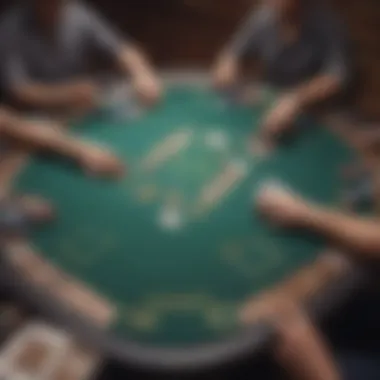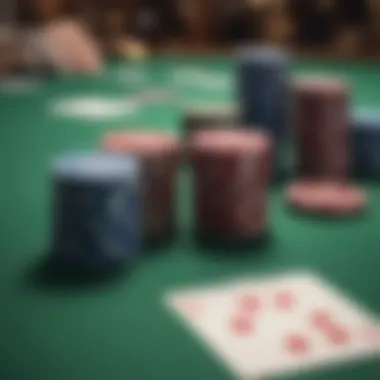Mastering the Art of Poke: Strategies and Insights


Intro
Diving into the world of poker is much like navigating through a dense forest. Each turn can lead to surprises, and understanding the terrain often means the difference between soaring success and a crash landing. Poker isn't just a game of chance; it's a delicate dance fueled by strategy, psychology, and intuition.
In this article, we aim to peel back the layers of this complex game, shedding light on the thought processes that underpin effective decision-making. Whether you’re a greenhorn just stepping into the arena or a seasoned strategist looking to sharpen your edge, there's something within to pique your interest.
Game Mechanics and Strategies
Understanding the Rules of Popular Games
Knowing the ins and outs of poker is crucial before you hit the felt. Different variations, like Texas Hold'em, Omaha, and Seven-Card Stud, each hold unique rules that can significantly affect your strategy. For instance, in Texas Hold'em, players are dealt two hole cards, and they aim to create the best hand using five shared community cards. Meanwhile, Omaha deals four hole cards with the same goal, but players must use exactly two from their hand and three from the board, leading to different strategic scenarios.
Advanced Strategies for Winning
Once you’ve grasped the rules, it's all about turning up the heat with advanced strategies. Here, bluffing stands as a cornerstone of sophisticated gameplay. However, it's a double-edged sword, carrying inherent risks. The art of reading your opponents—identifying tells, assessing betting patterns, and gauging their psychological state during gameplay—can be a game changer. Coupled with solid mathematics, understanding pot odds and implied odds can refine your decision-making by ensuring every bet aligns with the potential returns.
"In poker, every choice you make is like a chess move. It must be calculated, but often, it is also about predicting what others will do and staying one step ahead."
Gambling Culture and Trends
Evolution of Casino Gaming
The landscape of poker and gambling has transformed exponentially over the decades. Once perceived as a seedy backroom affair, it has evolved into a sophisticated social activity embraced by pop culture. From movies to television series, poker has carved out a niche in entertainment, captivating audiences and attracting new players. The rise of online casinos has also changed the game, creating an accessible environment where anyone with an internet connection can join in the fun.
Insights into Responsible Gambling Practices
With great power comes great responsibility, particularly when it comes to gambling. Responsible gaming ensures that the thrill of poker doesn't morph into a source of distress. Awareness about setting limits—both in terms of time and financial expenditures—is essential for maintaining control over one’s gambling habits. Resources and support networks are readily available for those who find themselves in need of assistance.
By considering these aspects of gameplay and gambling culture, we delve into the intricate dynamics of poker and how they shape the decisions we make at the table. Whether drawing from mathematical precision or the subtleties of human psychology, poker demands a multifaceted approach if one wishes to thrive.
In the sections to follow, we’ll dissect these themes further, culminating in a cohesive understanding that armors players with the necessary strategies to navigate the high-stakes world of poker.
Prologue to Poke
Poke, often regarded as an intricate dance of strategy and chance, has captivated the minds of gamblers, casino players, and poker enthusiasts for centuries. This article aims to unravel the multifaceted nature of poke, examining the essential elements that contribute to its allure. Understanding the foundational aspects of poke is crucial, especially for those venturing into the gaming landscape, as it sets the stage for deeper exploration into strategy, psychology, and the ever-evolving dynamics of gameplay.
At its core, poke is not merely a card game; it represents a confluence of skill, intuition, and mathematical reasoning. As players engage in this battle of wits, they navigate through a sea of decisions, each bearing weighty consequences. The significance of this exploration lies in its ability to equip both novice and seasoned players with the tools needed to improve their gameplay and enhance their overall experience.
Defining Poke
So, what exactly is poke? At its fundamental level, poke is a game played with a standard deck of cards, involving betting and strategic decision-making. Players take turns to act, and the objective varies depending on the specific variant being played. The game melds elements of luck with skillful tactics, creating a rich tapestry where every hand deals a potential lesson.
Poke can be played for fun or as a gambling venture, with stakes that can range from casual penny games to high-stakes tournaments that draw the world's best players. Understanding the rules and objectives is vital for anyone looking to dive into the game, not just to play but to thrive.
Historical Context
The history of poke is as winding as the strategies that players employ. Tracing its roots back to the early 19th century, the game likely originated in the riverboats of the Mississippi, where players engaged in small gatherings, often wagering their meager earnings on the outcome of the game. Over the decades, poke has evolved significantly, giving rise to numerous variants such as Texas Hold'em and Omaha, each with its own unique set of rules and style.
These changes have not only influenced how the game is played but also its perception in society. While once regarded as a pastime for the working class, poke has burgeoned into a global phenomenon, with high-profile tournaments like the World Series of Poker showcasing the elite of the game.
Cultural Significance
Beyond its gameplay and historical roots, poke holds substantial cultural significance. It represents a unique blend of competition, community, and camaraderie. Local games help foster relationships among players, whether it’s a friendly gathering in someone’s living room or a tournament in a casino lively with anticipation.
Moreover, poke has permeated popular culture, influencing films, literature, and even language. Phrases like "going all-in" have made their way into everyday vernacular, highlighting not just the game's impact but its essence—a fearless leap into uncertainty, where the stakes are high, but the potential rewards are tantalizing.
Understanding the Basics of Poke
Understanding the basics of poke is the cornerstone of effectively engaging with the game. For both newcomers and seasoned players, grasping several fundamental aspects can greatly enhance one's ability to not only play but thrive in this competitive environment. At its essence, knowing the rules, the various forms of the game, and the terminology that pepper discussions is similar to having a solid foundation before building a house—without it, everything else tends to collapse.
Game Structure and Rules
To start with, every player participating in poke must familiarize themselves with the structure of the game. Poke generally follows a set of rules designed to ensure that the gameplay is balanced and fair. For instance, most games are centered around a standard 52-card deck and involve several betting rounds. Players begin by placing a small bet or 'ante' to enter the game. As hands are dealt, players receive cards either face-up or face-down, depending on the variant being played.
The essence of the game is to create the best possible hand or bluff opponents into folding. The rules also dictate the ranking of hands – from a high card to a royal flush – each bringing varying degrees of strength and strategy. Players must be aware of terms like "all-in," "call," and "raise," in the context of betting. The nuances in rules across different variants of poke can sometimes lead to confusion, but understanding the basic structure is paramount for making informed decisions at the table.
Types of Poke Variants
When one considers the world of poke, the variants available can feel overwhelming. A few common forms include:
- Texas Hold'em: Known for its community card element, where two cards are dealt to each player, and five community cards are revealed.
- Omaha: Similar to Texas Hold'em but involves four hole cards instead of two.
- Seven-Card Stud: Players receive seven cards, three face-down and four face-up, with no community cards.
- Razz: A lowball variant where the objective is to make the lowest possible hand.


Each variant brings its own principles of strategy and skill. Some may find Texas Hold'em to be the most popular due to its blend of luck and skill, while others may enjoy Omaha for the unique decision-making it encourages. Knowing these varieties helps players determine which fits their style and strategy best.
Common Terminologies
Like any specialized activity, poke has its own lexicon. Mastering common terminology is essential, not just for gameplay but also for communication with fellow players. Here are some pivotal terms to become familiar with:
- Ante: A small bet all players must make to start betting.
- Bluff: The act of pretending to have a stronger hand than what is reality.
- Flush: A hand containing five cards of the same suit.
- Pot: The total amount of money wagered in a single hand.
Understanding these terms can improve a player's confidence and enhance their ability to follow, and participate in the game effectively. They also provide insight into strategy, as different terms can denote various tactics deployed throughout play.
"Without an understanding of the basics, every advanced strategy is simply a shot in the dark."
In sum, understanding the basics of poke is not just about memorizing rules or terminology. It's about building a foundation that allows for deeper strategy, smarter play, and most importantly, a greater appreciation for this classic game.
Strategizing Your Gameplay
In the world of poke, having a well-thought-out strategy can mean the difference between walking away from the table as the victor or feeling the sting of loss. At its core, strategizing your gameplay is about making informed decisions that can affect the outcome of each hand. This section will delve into the significance of strategic play, providing insights that cater to both novice and seasoned players alike. Understanding your position at the table and the tendencies of your opponents, coupled with fundamental strategies and advanced tactics, can significantly boost your chances of success.
Fundamental Strategies for Beginners
For those just starting their journey into the world of poke, a solid foundation is crucial. Here are some fundamental strategies that can help beginners navigate the complexities of the game:
- Starting Hand Selection: One of the first decisions you’ll make is which hands to play. New players often feel tempted to play too many hands. A disciplined approach, where you only play strong starting hands, lays the groundwork for long-term success.
- Position Awareness: Understanding the importance of your position is vital. Players acting later in the betting round generally have more information about their opponents' actions. Use this to your advantage by adjusting your strategies based on your position.
- Basic Betting Strategies: New players should also familiarize themselves with basic betting concepts such as check-raising and bluffing. While these techniques might feel advanced initially, they can be effective tools when employed at the right time.
"The beauty of poker is in the decisions made when faced with uncertainty. The key is knowing how best to navigate that uncertainty."
Advanced Tactics for Experienced Players
Once you’ve grasped the basics, it's time to elevate your game with advanced tactics. Experienced players often refine their strategies to become more unpredictable and exploitative:
- Reading Opponents: Players who excel at the game often develop the ability to interpret their opponents' behaviors and betting patterns. This skill enables you to make educated guesses on whether an opponent is strong or weak.
- Deceptive Play: Mastering the art of deception is a hallmark of skilled players. This involves playing a strong hand in a manner that suggests weakness, enticing your opponents to bet more, only to be met with a surprising showdown.
- Adapting Strategies: Experienced players often adjust their strategies in real-time, responding to the tendencies and playing styles of their opponents. Flexibility in strategy can give you the upper hand.
Bankroll Management
Arguably one of the most critical aspects of poker strategy is bankroll management. This involves not just having enough money to play, but also knowing how to manage it wisely:
- Setting Limits: It's important to set clear limits for how much money you are willing to invest at the table. This helps protect you from huge losses and ensures sustainable play over time.
- Understanding Stakes: Choosing the appropriate stakes according to your bankroll is key. Many experts suggest limiting individual buy-ins to a small percentage of your total bankroll to minimize risk.
- Tracking Your Progress: Keeping records of your wins and losses can help you understand your game better. It allows you to identify areas for improvement and can boost your decision-making for future sessions.
In this section, we've outlined how strategizing your gameplay can impact your overall success in poke. Emphasizing foundational strategies, sophisticated tactics for seasoned players, and the often-overlooked aspect of bankroll management can equip players with the tools they need to excel.
The Psychology of Poke
Understanding the psychology involved in gameplay is paramount for players who wish to enhance their effectiveness in Poke. Games like this aren't just about the cards you hold or the chips you stack; they involve a mental game that can make or break a player's success. The strategies you apply, the interactions you engage in, and the ability to remain calm under pressure are crucial elements contributing to the overall experience.
The psychological factors affecting gameplay include reading opponents, maintaining emotional control, and recognizing behavioral patterns. Each component influences decision-making and can lead to strategical advantages when mastered.
Reading Opponents
Reading your opponents isn't merely a skill; it's almost an art. When you sit at the table, each player's demeanor and actions convey subtle hints about their hand and intentions. These nuances can sometimes be more telling than the cards themselves. A player who has been aggressive may suddenly become passive, signaling a shift in their hand's strength.
- Facial Expressions: A slight grimace, a twitch of the lip, or wide eyes can indicate excitement or uncertainty.
- Betting Patterns: Notice when they raise or fold, as these habits can uncover their strategies.
- Timing: Is your opponent taking their time to make decisions? This can signify a strong hand or perhaps an over-calculation on a weaker one.
By staying observant, players can pick up on these behavioral signs, leading to better-informed choices.
"The untrained eye might miss crucial tells that a savvy player can exploit."
Emotional Control
In Poke, emotional control is as important as any strategy you might develop. The highs of winning and the lows of losing can play tricks on the mind. Successfully managing these feelings can mean the difference between consistent wins and disastrous losses. When a player allows frustration or excitement to cloud their judgment, they tend to make poor choices.
- Stay Focused: Don't let emotions take the driver's seat. Focus on your strategy regardless of the game's up or down swings.
- Mindfulness: Practice mindfulness techniques to stay grounded. Breathing exercises can help you gain clarity, especially in critical moments.
- Identify Triggers: Understand what emotions impact your gameplay negatively and work to manage those triggers effectively.
Behavioral Patterns
Every player has their own set of behavioral patterns, often shaped by their experiences and strategies. Recognizing these patterns in yourself and in others can provide significant insights during matches. For instance, if you tend to play aggressively after a win, anticipate how this might affect your gameplay and how opponents might react.
Conversely, knowing how opponents typically behave can give you an edge. Many players tend to follow similar paths based on their past experiences – the 'tight-aggressive' type, for example, is known to play fewer hands but raise more often.
Keep a mental note of the following:
- Common Patterns: Identify the patterns specific to your opponents; this may include their general risk tolerance or how they react to losses.
- Adaptation: Always be prepared to adapt your game plan based on their behavior shifts. If they’re changing their style, it may be time for you to reassess your approach.
- Self Reflection: Regularly self-reflect on your own gameplay patterns and be open to changing them if necessary.


Mastering the psychological aspects of Poke involves much more than just knowing strategy; it’s about understanding the unsaid words in your opponents' actions and being able to control your own mental state. By paying attention to these elements, you’ll find yourself playing with newfound confidence and skill.
Mathematical Foundations of Poke
Understanding the mathematical foundations of poke is fundamental for both beginners and seasoned players. The game is not just about the cards you hold but also about the calculations you make around those cards and your opponents' actions. Mastering the principles of probability, odds, and expected value forms the backbone of strategic gameplay and sound decision-making. These mathematical concepts empower players to analyze situations effectively, allowing them to assess risks and potentials in real-time.
Probability and Odds
Probability is the heartbeat of poker. It's how you gauge the likelihood of various outcomes based on the cards you’re dealt and the community cards on the table. Every action in the game comes with a probability attached to it. For instance, if you have a flush draw, the probability of hitting your desired card by the river is about 35%. This might sound straightforward, but understanding this percentage can shape your play dramatically.
In terms of odds, if you need one particular card to complete your flush, the odds of it appearing are 4 to 1 against you if you’re considering the turn card. The relationship between odds and probability can help you make informed decisions about folding, calling, or raising bets.
Furthermore, players should familiarize themselves with the concepts of implied odds and pot odds:
- Pot Odds: These represent the ratio of the current size of the pot to the cost of a contemplated call. Understanding how pot odds work can help you decide whether a call is profitable in the long run.
- Implied Odds: This takes into account not only the current pot but also the money you can potentially win on later betting rounds, giving a more comprehensive picture on the value of your hand.
Expected Value Calculations
Expected value (EV) is an intimidating term for many, but it’s simply a way to quantify what you can expect to win or lose over the long run based on your actions at the table. For instance, if a player bets $100 into a pot of $200, and you calculate that you have a 40% chance of winning, your expected value for calling that bet is:
[ EV = (Probability of Winning) \times (Winnings) - (Probability of Losing) \times (Cost) ] [ EV = 0.4 \times 300 - 0.6 \times 100 = 120 - 60 = 60 ]
This means calling could potentially have a positive expectation of $60 in the long run. Being able to perform these calculations on-the-fly can help determine whether the risk is worth it or if it's time to cut your losses.
Players need to internalize that not all hands are created equal; understanding the expected value of various actions can guide them to more profitable gameplay decisions.
Pot Odds Explained
Pot odds present one of the most crucial mathematical concepts every poker player should grasp. The idea is quite straightforward: you compare the amount of money in the pot against the cost of your currently contemplated call. If you’re facing a $50 bet and the pot is $200, the pot odds are 4 to 1.
Understanding when to call based on pot odds can be the difference between making a profitable decision or losing money overtime. To put it simply:
- Calculate the size of the pot plus any bet made.
- Calculate your call.
- Assess the ratio.
Here's a nifty example:
- Pot: $200
- Opponent’s Bet: $50
- Total Pot After Bet: $250
- Call: $50
- Pot odds: $250 / $50 = 5 to 1.
In this scenario, you would only need to win 17% of the time (which is the inverse of your 5 to 1 pot odds) to make a break-even call. If your chances of winning exceed that percentage, then you're looking at a decent opportunity.
Understanding and integrating these mathematical elements into your gameplay not only boosts your analytical skills but also assists in streamlining your strategy when facing varied opponents.
"While many expect poker to be merely about luck, it’s the brain that wins the game."
Ultimately, making informed bets based on a sound understanding of the math can lead to significantly improved outcomes on the felt.
Incorporating Technology in Poke
The landscape of poker has evolved remarkably over the last few decades, and technology plays a pivotal role in this transformation. Traditional poker, while maintaining its core essence, has progressed with the advent of digital platforms and analytical tools. Understanding technology in poker is essential for players who wish to sharpen their skills, streamline their strategies, and enhance their overall gameplay experience.
Online Poke Platforms
Online poker platforms have become a lifeline for enthusiasts across the globe. Sites like PokerStars, PartyPoker, and 888poker offer players a convenient avenue to play poker at any time, from anywhere, without the constraints of physical casino locations. These platforms cater to diverse skill levels, providing everything from casual games for novices to high-stakes tournaments for seasoned pros.
The benefits of online poker platforms are multifaceted:
- Accessibility: Players can join games on a whim, whether they have five minutes or five hours.
- Variety of Games: Options aren’t limited to Texas Hold'em; players can explore variants like Omaha, Seven Card Stud, and more.
- Global Player Pool: Competing against a wide array of opponents can pinpoint a player’s strengths and weaknesses against different styles and approaches.
- Practice Opportunities: Many platforms offer free-to-play games, allowing novices to hone their skills without financial risk.
All in all, these virtual spaces have opened the doors for countless individuals to engage with the game.
Software Tools for Analysis
To bolster their strategies, poker players increasingly rely on software tools designed for gameplay analysis. Programs such as Hold'em Manager and PokerTracker have gained substantial traction because they help players analyze their hands, track their performance, and understand their opponent’s tendencies.
Utilizing these tools can yield numerous advantages:
- Data Tracking: Players can maintain records of their games to identify patterns, mistakes, and successes.
- Hand Analysis: Reviewing past hands enables players to pinpoint strategic gaps and decision-making flaws, allowing for targeted improvement.
- Opponent Profiling: These programs can analyze an opponent’s playing style, offering insights into tendencies that players can exploit during gameplay.
"In the world of poker, knowledge is power, and tools that provide insights can change the course of a game."
While the integration of technology enhances the poker experience, it poses challenges. Players must also consider the risks of over-reliance on software, which could lead to a skewed perception of intuition and gameplay skills. Striking a balance between traditional skills and technological support is key.


In summary, incorporating technology into poker not only enriches the gameplay experience but also refines the strategic approaches players utilize. Harnessing the capabilities provided by online platforms and analytical tools is essential for anyone serious about enhancing their skills in today’s competitive environment.
Ethical Considerations in Poke
Ethics in the realm of poke extend far beyond the cards on the table. They shape not only personal playstyles but also the landscape of the game itself. As more players engage with poke, it becomes increasingly important to reflect on how ethics play a role in ensuring a fair and enjoyable experience for everyone involved. Among the critical elements to consider are the integrity of the game, the responsibilities of both players and the establishments that host these games, as well as the broader impact on society and the culture surrounding gambling.
Gambling Ethics
When discussing gambling ethics, one must first consider fairness and transparency. In poke, as with any betting activity, players expect a level playing field. This expectation drives both casual players and professionals alike. Cheating, whether through collusion or using marks on cards, isn't just frowned upon — it's fundamentally against the spirit of the game. Maintaining the integrity of the game is paramount, which brings us to the role of casino operators and platforms. They have a duty to implement strict policies against cheating and to create an environment where ethical play is encouraged.
Furthermore, regulating the conduct of players is essential. A player who employs unethical tactics can tarnish the experience for others at the table. As the saying goes, "a few bad apples spoil the bunch." Ethical behavior fosters community trust and encourages new players to join in the fun without fear of exploitation.
The emphasis on ethical gambling has led to the implementation of various responsible gaming programs. Many casinos and online platforms provide resources for players who may feel overwhelmed or out of control. Such initiatives not only protect the players but also enhance the reputation of the gaming industry as a whole. As gamblers, engaging with these ethical guidelines serves to uplift the community and promote a healthier gambling environment.
Player Responsibility
Player responsibility is closely interlinked with gambling ethics. It isn't enough to simply abide by the rules; you must also take personal accountability for your actions. This responsibility manifests in several ways, including recognizing when to bet, knowing your limits, and understanding the repercussions of gambling.
Being aware of your gambling habits means being able to assess whether you're playing for leisure or if it has turned into an unhealthy obsession. Personal responsibility also involves managing your bankroll wisely. Setting limits and knowing when to walk away is crucial in maintaining a healthy relationship with the game.
Moreover, being a responsible player means treating fellow players—and the game itself—with respect. Observe the rules, whether they're about betting limits or time at the table. When everyone understands and follows these boundaries, the atmosphere becomes more pleasant, and enjoyment is maximized for all participants.
"In the world of poker, your greatest competition often lies within yourself. Take responsibility for your choices, and the rewards will follow."
The onus of maintaining ethical standards is as much on the industry as it is on individuals. As gambling enthusiasts, fostering a culture of accountability and ethics sets the foundation for a more enjoyable, dynamic, and ultimately sustainable gaming environment.
In summary, understanding the ethics and responsibilities in poke not only enriches individual gameplay but also contributes to the overall vitality of the community. As players and enthusiasts, it's crucial for us to lead the charge in cultivating an environment where fair play and personal accountability reign supreme.
The Social Aspects of Poke
Understanding the social dynamics within the world of poke is critical for any player. The game isn’t just a solitary pursuit of skill and strategy but rather a blend of interaction, community, and networking. It involves reading not just the cards or the table, but also the atmosphere and the personalities involved. This social fabric significantly shapes the experience, influencing decisions and outcomes in subtle yet profound ways.
Community Dynamics
In any poker setting, whether it be a smoky casino or an online platform, community dynamics play a pivotal role. Players form groups that can range from friendly camaraderie to competitive rivalries. Being aware of these dynamics can give you an edge over opponents. For instance, in a tight-knit group, players might share insights or subtle signals that can affect betting actions. Conversely, in a more diverse crowd, behavior might be erratic, reflecting a wider range of playing styles.
- Interactions between players: The relationships between players can influence decisions at the table. Familiarity allows players to exploit weaknesses, while new players may face tougher scrutiny.
- Online vs. in-person communities: Online gaming fosters a different kind of community. Players connect through forums and social media sites like Reddit and Facebook, which can lead to collaboration or even stiffer competition.
“The ability to read social cues is just as crucial as calculating odds.”
Understanding how community dynamics can affect gameplay is essential. For example, when you play alongside someone familiar, their betting patterns can offer insights into their hands. On the flip side, you might have to approach newcomers with caution, as their unpredictability may challenge your usual strategies.
Networking in Poke
Networking within the poker community greatly enhances a player’s journey. Building relationships can open doors to opportunities that go beyond the game itself. Many players find that their connections lead to exclusive events, larger stakes, and even mentorship.
- Finding mentors: Networking can allow novice players to meet experienced ones who are willing to share their knowledge. Having the right mentor can drastically accelerate your learning curve.
- Building a reputation: Over time, consistent play and interaction can build your reputation within the community. Being known as a knowledgeable and respectful player attracts others to engage with you.
- Accessing resources: Through networking, players often exchange valuable resources such as articles, training programs, or private game invitations.
The End and Future Trends in Poke
The exploration of Poke isn’t just a mere academic exercise; it’s the thread connecting the past, present, and future of a game that has captivated millions. As players consider how to navigate this intricate landscape, the significance of understanding the essential elements from strategy to cultural context becomes glaringly apparent. Poke isn’t static; it evolves with society, technology, and the players themselves.
Recap of Key Points
In dissecting this gaming phenomenon, several salient themes emerge:
- The foundational concepts of Poke establish a solid grounding for all players, new and experienced alike.
- Strategic frameworks offer pathways for enhancing gameplay and decision-making, including mental fortitude and mathematical considerations.
- Social dynamics foster community relationships that can greatly influence a player’s journey through Poke.
This recap serves not only to summarize but to reaffirm the importance of continual learning in a game where the odds shift and change with every hand played.
Emerging Trends in Gameplay
Several trends have started shaping how Poke is played today:
- Hybrid Play Styles: Players are increasingly blending traditional and modern techniques, incorporating lessons learned from online platforms while savoring the ambiance and unpredictability of physical tables.
- Data Analytics: Tools that harness big data for insights are changing strategic approaches, as players seek the upper hand through performance metrics and game simulations.
- Mental Health Awareness: Acknowledging the psychological demands of Poke is gaining traction, sparking dialogues around emotional resilience, player support programs, and the balance between gaming and well-being.
These trends reflect an adaptation to a changing environment, pushing players to reinvent their approach continually.
The Future of Poke in Gambling Culture
Looking forward, the landscape of Poke is poised for transformation, integrating further into mainstream gambling culture. Significant factors will likely include:
- Legislative Changes: With ongoing conversations around legalized gambling worldwide, Poke could see wider acceptance and participation.
- Technological Advancements: Innovations in virtual reality, augmented reality, and AI could introduce entirely new ways to engage with the game, making it more accessible to a broader audience.
- Educational Programs: Increasing interest from educational institutions in teaching Poke strategy and psychology may enhance the game’s reputation as a legitimate pursuit.
"The future of Poke is as promising as a royal flush, waiting for the right players to capitalize on the opportunities that lie ahead."
The conclusion crystallizes a multifaceted view of Poke, respecting its rich heritage while casting a hopeful eye toward its future. As players embrace innovation and continue to refine their skills, they not only enrich their own experiences but also contribute to the blossoming culture that surrounds this enduring game.















